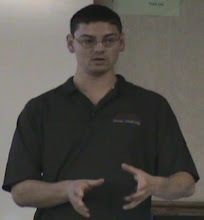 Scientific American has published an article in this month's (January 2010) issue titled The Next 20 Years of Microchips: Pushing Performance Boundaries. It gives a good 50,000 foot overview (about half a page each) to several areas computers will probably move into over the next decade or two. Quantum computing is mentioned as one of them, and the fact that they've been writing about the subject often recently reflects the growing interest in the field. The article also covers other topics such as optical and biological computing.
Scientific American has published an article in this month's (January 2010) issue titled The Next 20 Years of Microchips: Pushing Performance Boundaries. It gives a good 50,000 foot overview (about half a page each) to several areas computers will probably move into over the next decade or two. Quantum computing is mentioned as one of them, and the fact that they've been writing about the subject often recently reflects the growing interest in the field. The article also covers other topics such as optical and biological computing.If you're a graduate student looking for a research area, I recommend checking out this article. Picking a "bleeding edge" subject means there is still a lot of work to be done- and this article mentions a lot of these subjects. This can make identifying a particular niche to fill much easier, and obviously there is less of a chance of someone doing the same thing in parallel. (A classic doctoral student fear: having someone else publish the same thing right before you finish.) Not only does it make things easier, but I personally found it extremely interesting and rewarding working on a topic that is ahead of the curve.

Yeah, it's really an interesting work to try to figure out how to make coherent qubits. But you can begin it as doctoral research only if you already have ideas looking promising. Otherwise you can just kill the time and result in nothing eminent.
ReplyDeleteVery true. I think there are plenty of open problems in quantum computing from a computer science perspective however.
ReplyDelete